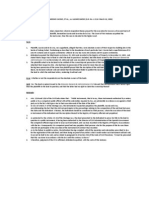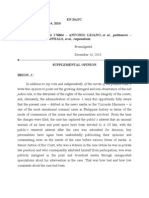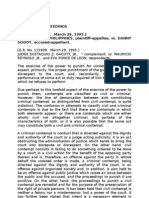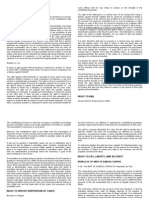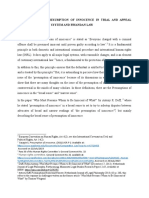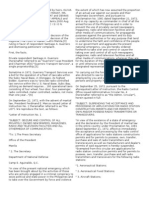0 ratings0% found this document useful (0 votes)
255 viewsPeople Vs Velasco
People Vs Velasco
Uploaded by
Sarah TaliThis document discusses the rules around acquittal and double jeopardy. It establishes that an acquittal is final whether at the trial court level or appellate level. However, if the prosecution was denied due process such that the trial was considered a "sham", double jeopardy does not apply and the case can be remanded for a new trial. Specifically, the document discusses a past case where the trial resulting in acquittal was considered void because the authoritarian president had rigged and closely monitored the trial to achieve acquittal. In such cases where the trial was not legitimate, double jeopardy does not prevent appeal or reopening of the case.
Copyright:
© All Rights Reserved
Available Formats
Download as DOCX, PDF, TXT or read online from Scribd
People Vs Velasco
People Vs Velasco
Uploaded by
Sarah Tali0 ratings0% found this document useful (0 votes)
255 views2 pagesThis document discusses the rules around acquittal and double jeopardy. It establishes that an acquittal is final whether at the trial court level or appellate level. However, if the prosecution was denied due process such that the trial was considered a "sham", double jeopardy does not apply and the case can be remanded for a new trial. Specifically, the document discusses a past case where the trial resulting in acquittal was considered void because the authoritarian president had rigged and closely monitored the trial to achieve acquittal. In such cases where the trial was not legitimate, double jeopardy does not prevent appeal or reopening of the case.
Original Description:
digest
Original Title
People vs Velasco
Copyright
© © All Rights Reserved
Available Formats
DOCX, PDF, TXT or read online from Scribd
Share this document
Did you find this document useful?
Is this content inappropriate?
This document discusses the rules around acquittal and double jeopardy. It establishes that an acquittal is final whether at the trial court level or appellate level. However, if the prosecution was denied due process such that the trial was considered a "sham", double jeopardy does not apply and the case can be remanded for a new trial. Specifically, the document discusses a past case where the trial resulting in acquittal was considered void because the authoritarian president had rigged and closely monitored the trial to achieve acquittal. In such cases where the trial was not legitimate, double jeopardy does not prevent appeal or reopening of the case.
Copyright:
© All Rights Reserved
Available Formats
Download as DOCX, PDF, TXT or read online from Scribd
Download as docx, pdf, or txt
0 ratings0% found this document useful (0 votes)
255 views2 pagesPeople Vs Velasco
People Vs Velasco
Uploaded by
Sarah TaliThis document discusses the rules around acquittal and double jeopardy. It establishes that an acquittal is final whether at the trial court level or appellate level. However, if the prosecution was denied due process such that the trial was considered a "sham", double jeopardy does not apply and the case can be remanded for a new trial. Specifically, the document discusses a past case where the trial resulting in acquittal was considered void because the authoritarian president had rigged and closely monitored the trial to achieve acquittal. In such cases where the trial was not legitimate, double jeopardy does not prevent appeal or reopening of the case.
Copyright:
© All Rights Reserved
Available Formats
Download as DOCX, PDF, TXT or read online from Scribd
Download as docx, pdf, or txt
You are on page 1of 2
People vs velasco
where acquittal is concerned, the rules do not distinguish whether it
occurs at the level of the trial court or on appeal from a judgment of
conviction. This firmly
establishes the finality-of-acquittal rule in our jurisdiction. Therefore, as
mandated by our Constitution, statutes and cognate jurisprudence, an
acquittal is final and unappealable on the ground of double jeopardy,
whether it happens at the trial court level or before the Court of
Appeals.
In general, the rule is that a remand to a trial court of a judgment of
acquittal brought before the Supreme Court on certiorari cannot be had
unless there is a finding of mistrial, as in Galman v. Sandiganbayan.
Condemning the trial before the Sandiganbayan of the murder of
former Senator Benigno "Ninoy" Aquino, which resulted in the acquittal
of all the accused, as a sham, this Court minced no words in declaring
that "[i]t is settled doctrine that double jeopardy cannot be invoked
against this Court's setting aside of the trial court's judgment of
acquittal where the
prosecution which represents the sovereign people in criminal cases is
denied due process x x x x [T]he sham trial was but a mock trial where
the authoritarian president ordered respondents Sandiganbayan and
Tanodbayan to rig the trial, and closely monitored the entire
proceedings to assure the predetermined final outcome of acquittal
and absolution as innocent of all the respondent-accused x x x x
Manifestly, the prosecution and the sovereign people were denied due
process of law with a partial court and biased Tanodbayan under the
constant and pervasive
monitoring and pressure exerted by the authoritarian president to
assure the carrying out of his instructions. A dictated, coerced and
scripted verdict of acquittal, such as that in the case at bar, is a void
judgment. In legal contemplation, it is no judgment at all. It neither
binds nor bars anyone. Such a judgment is a lawless thing which can
be treated as an outlaw. It is a terrible and unspeakable affront to the
society and the people. 'To paraphrase Brandeis: If the authoritarian
head of
government becomes the lawbreaker, he breeds contempt for the law;
he invites every man to become a law unto himself; he invites anarchy.
The contention of respondent-accused that the Sandiganbayan
judgment of acquittal ended the case and could not be appealed or
reopened without being put in double jeopardy was forcefully disposed
of by the Court in People v. Court of Appeals:
x x x x That is the general rule and presupposes a valid
judgment. As earlier pointed out, however, respondent Court's
Resolution of acquittal was a void judgment for having been
issued without jurisdiction. No double jeopardy attaches,
therefore. A void judgment is, in legal effect, no judgment at all.
By it no rights are
divested. Through it, no rights can be attained. Being worthless,
all proceedings founded upon it are equally worthless. It neither
binds nor bars anyone. All acts performed under it and all claims
flowing out of it are void x x x x Private respondents invoke
'justice for the innocent.' For justice to prevail the scales must
balance. It is not to be dispensed for the accused alone. The
interests of the society which they have wronged, must also be
equally considered. A judgment of conviction is not necessarily a
denial of justice. A verdict of acquittal neither necessarily spells
a triumph of justice. To the party wronged, to the society
offended, it could also mean injustice. This is where the Courts
play a vital role. They render justice where justice is due.
Thus, the doctrine that "double jeopardy may not be invoked after
trial" may apply only when the Court finds that the criminal trial was a
sham because the prosecution representing the sovereign people in
the criminal case was denied due process.[89] The Court in People v.
Bocar rationalized that the "remand of the criminal case for further
hearing and/or trial before the lower courts amounts merely to a
continuation of the first jeopardy, and does not expose the accused to
a second jeopardy."
You might also like
- PALEDocument22 pagesPALEYANG FLNo ratings yet
- Writing Effective Public Policy Papers Young QuinnDocument121 pagesWriting Effective Public Policy Papers Young QuinnBelmaGijo83% (6)
- Clearfield Trust Co v. USDocument8 pagesClearfield Trust Co v. USMikhael Yah-Shah Dean: Veilour100% (2)
- Petition For Mandamus Supreme Court To PNP, CHR, DOJ ChiefsDocument34 pagesPetition For Mandamus Supreme Court To PNP, CHR, DOJ ChiefsRam Talabong100% (1)
- Cacnio vs. Baens DIGESTDocument1 pageCacnio vs. Baens DIGESTStephanie Reyes Go100% (2)
- People-vs.-Velasco DigestDocument7 pagesPeople-vs.-Velasco DigestJesa FormaranNo ratings yet
- Article III Bill of Rights Sec 21Document7 pagesArticle III Bill of Rights Sec 21Celestiono_122321No ratings yet
- Judge Caverly's Decision and SentenceDocument4 pagesJudge Caverly's Decision and SentenceKara TomNo ratings yet
- BrionDocument7 pagesBrionSeth RavenNo ratings yet
- Juris. Probable Cause. PIDocument4 pagesJuris. Probable Cause. PISamJadeGadianeNo ratings yet
- Del Castillo vs. JavelonaDocument5 pagesDel Castillo vs. JavelonaErwin LavadorNo ratings yet
- G.R. No. 237489Document3 pagesG.R. No. 237489maprecc07No ratings yet
- Bill of Rights: He Right To Life and Liberty Is More Important Than The Right To PropertyDocument10 pagesBill of Rights: He Right To Life and Liberty Is More Important Than The Right To PropertyLouise Marie PomidaNo ratings yet
- Jurisdiction - 2. People Vs EduarteDocument3 pagesJurisdiction - 2. People Vs EduarteDonna Joyce de BelenNo ratings yet
- Brion's Supplemental Opinion On Webb Et Al Re Vizconde MassacreDocument8 pagesBrion's Supplemental Opinion On Webb Et Al Re Vizconde MassacreGerald MagnoNo ratings yet
- People vs. GodoyDocument30 pagesPeople vs. GodoyjoanaarilyncastroNo ratings yet
- Estipona, Jr. v. LobrigoDocument2 pagesEstipona, Jr. v. LobrigoMACNo ratings yet
- CONTEMPT OF COURT JurisprudenceDocument10 pagesCONTEMPT OF COURT Jurisprudencenxfkfbvjw7No ratings yet
- Ha Datu Tawahig VDocument4 pagesHa Datu Tawahig VShery Ann ContadoNo ratings yet
- 12 Rights of AccusedDocument62 pages12 Rights of AccusedNikita DaceraNo ratings yet
- Pangilinan v. CADocument4 pagesPangilinan v. CAMer CeeNo ratings yet
- In-Re-Almacen-31-SCRA-562Document42 pagesIn-Re-Almacen-31-SCRA-562Samuel Mangetag jrNo ratings yet
- Legal EthicsDocument21 pagesLegal EthicsIrish Asilo PinedaNo ratings yet
- Legal Terms PDFDocument23 pagesLegal Terms PDFAzeem ur rehmanNo ratings yet
- CANON 13, 14 and 15 - LegProf NewDocument22 pagesCANON 13, 14 and 15 - LegProf NewJennica Gyrl G. DelfinNo ratings yet
- CCL Assign. HimsDocument13 pagesCCL Assign. Himshimanshu kumarNo ratings yet
- 1 - HILTON v. GUYOTDocument6 pages1 - HILTON v. GUYOTGustavo alonso DELGADO BRAVONo ratings yet
- Government of The United States of America vs. Purganan PDFDocument125 pagesGovernment of The United States of America vs. Purganan PDFDianne May CruzNo ratings yet
- Provisional Remedies Cases - Preliminary AttachmentDocument88 pagesProvisional Remedies Cases - Preliminary AttachmentMaku Pascual100% (1)
- Spouses Romualdez Vs COMELECDocument5 pagesSpouses Romualdez Vs COMELECAbigail DeeNo ratings yet
- Jurisprudence Contempt ProceedingsDocument12 pagesJurisprudence Contempt ProceedingsRacinef Tee100% (4)
- Bhandulananda Jayatilake V Public Prosecutor RespDocument5 pagesBhandulananda Jayatilake V Public Prosecutor RespAdlyZulfadhlyZulkeflyNo ratings yet
- Cabansag v. Fernandez Ref./Date/ Pn. G.R. No. L8974 October 18, 1957Document4 pagesCabansag v. Fernandez Ref./Date/ Pn. G.R. No. L8974 October 18, 1957Angeline BoNo ratings yet
- Garcia V Domingo - VicenteDocument2 pagesGarcia V Domingo - Vicenteedson vicenteNo ratings yet
- Report On New Code of Judicial ConductDocument41 pagesReport On New Code of Judicial ConductJan PriorNo ratings yet
- Comments on Recent Judicial DecisionsDocument8 pagesComments on Recent Judicial DecisionsandrewsundayichabaNo ratings yet
- Daan vs. Sandiganbayan (Fourth Division), 550 SCRA 233, March 28, 2008Document16 pagesDaan vs. Sandiganbayan (Fourth Division), 550 SCRA 233, March 28, 2008TNVTRL100% (1)
- Govt. v. PurgananDocument25 pagesGovt. v. Purgananspringchicken88No ratings yet
- 11 Chapter 5Document84 pages11 Chapter 5Ravi Singh SolankiNo ratings yet
- 124539-1998-Alonte v. Savellano Jr.Document49 pages124539-1998-Alonte v. Savellano Jr.Monique Allen LoriaNo ratings yet
- Critique On Quo WarrantoDocument3 pagesCritique On Quo WarrantoJepoy Nisperos ReyesNo ratings yet
- Legal Ethics For MIDTERMSDocument30 pagesLegal Ethics For MIDTERMSclaire beltranNo ratings yet
- Petitioner Vs Vs Respondents: en BancDocument48 pagesPetitioner Vs Vs Respondents: en BancJela SyNo ratings yet
- C Dacudao V GonzalesDocument15 pagesC Dacudao V GonzalesLester AgoncilloNo ratings yet
- Nunez v. Sandiganbayan, 111 SCRA 433, G.R. 50581-50617Document23 pagesNunez v. Sandiganbayan, 111 SCRA 433, G.R. 50581-50617ElieNo ratings yet
- Lang v. New Jersey, 209 U.S. 467 (1908)Document4 pagesLang v. New Jersey, 209 U.S. 467 (1908)Scribd Government DocsNo ratings yet
- Relevancy of Judgments of Courts of JusticeDocument8 pagesRelevancy of Judgments of Courts of JusticeRakhi GiriNo ratings yet
- Nuñez vs. SandiganbayanDocument53 pagesNuñez vs. SandiganbayanJuris SyebNo ratings yet
- 141637-1970-In Re Almacen v. YaptinchayDocument28 pages141637-1970-In Re Almacen v. YaptinchayMichaela RetardoNo ratings yet
- Andal Vs PEOPLEDocument2 pagesAndal Vs PEOPLEGRAND LINE GMSNo ratings yet
- Plaintiff-Appellee Accused-Appellant: People of The Philippines, Danny GodoyDocument38 pagesPlaintiff-Appellee Accused-Appellant: People of The Philippines, Danny GodoyKarl OdroniaNo ratings yet
- Definition of TermsDocument11 pagesDefinition of TermsRalph TiempoNo ratings yet
- 124539-1998-Alonte v. Savellano Jr.Document48 pages124539-1998-Alonte v. Savellano Jr.elma campoNo ratings yet
- Bill of RightsDocument13 pagesBill of RightsmarvinNo ratings yet
- Amnesty Compared W/ Pardon - Admission Not Needed in AmnestyDocument7 pagesAmnesty Compared W/ Pardon - Admission Not Needed in Amnestyarajara16No ratings yet
- PILONEO - 14 - G.R. No. 240056Document5 pagesPILONEO - 14 - G.R. No. 240056Francess PiloneoNo ratings yet
- Right Against Self-Incrimination: People vs. GallardeDocument6 pagesRight Against Self-Incrimination: People vs. GallardeAriel GalamgamNo ratings yet
- Fortun V QuinsayasDocument23 pagesFortun V Quinsayasanne6louise6panagaNo ratings yet
- David vs. Marquez, 825 SCRA 530, G.R. No. 209859 June 5, 2017Document33 pagesDavid vs. Marquez, 825 SCRA 530, G.R. No. 209859 June 5, 2017Jm SantosNo ratings yet
- Tan vs. Gallardo (Magsanay)Document3 pagesTan vs. Gallardo (Magsanay)Anonymous FrQ6V5No ratings yet
- 10.11 Fuertes vs. Senate of The PhilippinesDocument59 pages10.11 Fuertes vs. Senate of The PhilippinesJm SantosNo ratings yet
- Comparative of Presumption of Innocence in Trial and Appeal Under Common Law System and Rwandan LawDocument9 pagesComparative of Presumption of Innocence in Trial and Appeal Under Common Law System and Rwandan LawDesire MugishaNo ratings yet
- Aparicio vs. Andal, 175 SCRA 569, July 25, 1989Document2 pagesAparicio vs. Andal, 175 SCRA 569, July 25, 1989tinctNo ratings yet
- Pre-Week 2017 - FriaDocument6 pagesPre-Week 2017 - FriaSarah TaliNo ratings yet
- Civ Digest OctoberDocument24 pagesCiv Digest OctoberSarah TaliNo ratings yet
- B17 People v. TeodoroDocument1 pageB17 People v. TeodoroSarah TaliNo ratings yet
- Acol Vs PcibankDocument2 pagesAcol Vs PcibankSarah TaliNo ratings yet
- De Guzman Vs Angeles (Digest)Document2 pagesDe Guzman Vs Angeles (Digest)Sarah Tali100% (2)
- Oblicon Article 1193Document10 pagesOblicon Article 1193Sarah TaliNo ratings yet
- Fruit of The LoomDocument2 pagesFruit of The LoomSarah TaliNo ratings yet
- Carticiano Vs NuvalDocument2 pagesCarticiano Vs NuvalSarah TaliNo ratings yet
- Gabriel v. CADocument4 pagesGabriel v. CASarah TaliNo ratings yet
- Metropolitan Vs CADocument10 pagesMetropolitan Vs CASarah TaliNo ratings yet
- PALE 3. Navarro v. Solidum, Jr.Document6 pagesPALE 3. Navarro v. Solidum, Jr.Sarah TaliNo ratings yet
- The Athens Democracy and Its CriticsDocument27 pagesThe Athens Democracy and Its CriticsSarah TaliNo ratings yet
- Durban Vs Pioneer Insurance and Surety CorporationDocument2 pagesDurban Vs Pioneer Insurance and Surety CorporationSarah TaliNo ratings yet
- (Redirected From) : Not To Be Confused WithDocument15 pages(Redirected From) : Not To Be Confused WithVictoria Alexander100% (1)
- Penalties That May Be Imposed.: Title Three Penalties Chapter One Penalties in General Article 21Document22 pagesPenalties That May Be Imposed.: Title Three Penalties Chapter One Penalties in General Article 21Denni Dominic Martinez LeponNo ratings yet
- Baritua Vs CA 183 Scra 565Document3 pagesBaritua Vs CA 183 Scra 565Soc SaballaNo ratings yet
- Civil Rights Cases: Atlanta Motel, Inc. v. United States, The Supreme Court Held ThatDocument10 pagesCivil Rights Cases: Atlanta Motel, Inc. v. United States, The Supreme Court Held ThatRobertYinglingNo ratings yet
- South Florida College Student Stole Nearly $1.3M To Live Extravagant LifestyleDocument20 pagesSouth Florida College Student Stole Nearly $1.3M To Live Extravagant LifestyleSabrina LoloNo ratings yet
- 1996 C L C 94Document10 pages1996 C L C 94hammad buttNo ratings yet
- Intengan vs. Court of AppealsDocument2 pagesIntengan vs. Court of Appealsnicole5anne5ddddddNo ratings yet
- TLE0317ra Manila PDFDocument145 pagesTLE0317ra Manila PDFPhilBoardResultsNo ratings yet
- Ermita Hotel v. City Mayor of ManilaDocument7 pagesErmita Hotel v. City Mayor of ManilaPat EspinozaNo ratings yet
- MEMO AdoptionDocument4 pagesMEMO AdoptionChristian UrbinaNo ratings yet
- 20) Santos v. Public Service CommissionDocument1 page20) Santos v. Public Service CommissionRuby SantillanaNo ratings yet
- Documents Indian Evidence ActDocument5 pagesDocuments Indian Evidence Actaaditya dhawanNo ratings yet
- 2010 GR 180917Document13 pages2010 GR 180917Jocelyn NapiereNo ratings yet
- 2 Tan V RoseteDocument2 pages2 Tan V RoseteJudy Ann ShengNo ratings yet
- Labiano Succession DigestDocument2 pagesLabiano Succession DigestKrishianne LabianoNo ratings yet
- SEC vs. Interport Resources Corp.Document4 pagesSEC vs. Interport Resources Corp.Minorka Sushmita Pataunia SantoluisNo ratings yet
- G.R. No.185100 July 9, 2014 - Ico Vs Systems Technology InstituteDocument2 pagesG.R. No.185100 July 9, 2014 - Ico Vs Systems Technology InstituteeogyramNo ratings yet
- Income Tax ReturnDocument1 pageIncome Tax ReturnAntonio Inzulza100% (1)
- Coso Vs Fernandez DezaDocument1 pageCoso Vs Fernandez DezaRaf RufNo ratings yet
- Rosario Vs de GuzmanDocument7 pagesRosario Vs de GuzmanTESDA MIMAROPANo ratings yet
- Phil. Vet. Bank Employess Vs Phil. Vet. Bank DigestDocument1 pagePhil. Vet. Bank Employess Vs Phil. Vet. Bank DigestLennart ReyesNo ratings yet
- Leal V IAC PDFDocument9 pagesLeal V IAC PDFChaNo ratings yet
- Rule On Dna & Electronic EvidenceDocument11 pagesRule On Dna & Electronic EvidenceMarefel Anora100% (1)
- Victoria No Magat vs. Medialdea (206 Phil 341)Document5 pagesVictoria No Magat vs. Medialdea (206 Phil 341)Fides DamascoNo ratings yet
- Chapter 2 Taxes Tax Laws and Tax AdministrationDocument29 pagesChapter 2 Taxes Tax Laws and Tax Administrationdexter padayaoNo ratings yet
- General Milling Corp. V Spouses Ramos, GR No. 193723Document11 pagesGeneral Milling Corp. V Spouses Ramos, GR No. 193723Bianca BeltranNo ratings yet
- Arbirtration Case BriefsDocument26 pagesArbirtration Case BriefsSOHAM DASNo ratings yet





